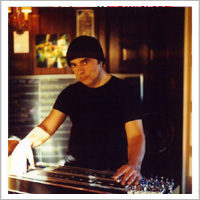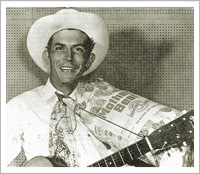By Don Jacobson
Daniel Lanois’ artsy take on Chicago meets Hank Williams’ traditional take on hellfire and the city.
Rocky World/Daniel Lanois
It’s not too often that Chicago is included in song lyrics of the truly artistic stripe. In most cases, I have to say, the city is called out in songs with the simplest of intentions. It’s kind of a sad state of affairs. Despite some apparent progress in sophistication that the city has made since, say, the 1920s, Chicago as a lyrical metaphor still seems to appeal to songwriters who merely want to employ its image to bash across some simple message, usually having something to do with pain, loss, human depravity or some combination thereof. Every time I see a song lyric that refers to Chicago as a gangster haven or as some kind of poverty-stricken wasteland (and there are so many), I have to shake my head and say, now I know how it feels to be typecast.
That brings me to “Rocky World” by Daniel Lanois. How refreshing it is to find a lyrical reference to Chicago that’s artsy enough to make me scratch my head and wonder, at least for a few seconds, what it really means. Basically, Lanois name-checks the city in what I believe is an articulation of a Canadian’s vision of the United States as something like a battlefield where you can win a living but lose everything that really matters.
 Lanois, of course, is a French Canadian from Quebec. But in “Rocky World,” the storyteller seems more like an Ontarian because of the references to Sault Ste. Marie, Michigan and Chicago (according to his biography, Lanois started his record career in Hamilton, Ontario, across from Detroit). Lanois included this song as the wrap-up to his second solo record, For the Beauty of Wynona, released in 1993, at the height of his hipness factor. He had, along with Brian Eno, spent most of the late 1980s shaping U2’s sound as co-producer of The Unforgettable Fire and The Joshua Tree. Then, thanks to Bono’s recommendation, Bob Dylan teamed with Lanois in 1989 on Oh Mercy.
Lanois, of course, is a French Canadian from Quebec. But in “Rocky World,” the storyteller seems more like an Ontarian because of the references to Sault Ste. Marie, Michigan and Chicago (according to his biography, Lanois started his record career in Hamilton, Ontario, across from Detroit). Lanois included this song as the wrap-up to his second solo record, For the Beauty of Wynona, released in 1993, at the height of his hipness factor. He had, along with Brian Eno, spent most of the late 1980s shaping U2’s sound as co-producer of The Unforgettable Fire and The Joshua Tree. Then, thanks to Bono’s recommendation, Bob Dylan teamed with Lanois in 1989 on Oh Mercy.
That, too, was a huge hit with the fans as well as the critics, and Lanois’ musical capital was off the charts. He decided to use this golden opportunity in part to pull out all the stops on a solo album for himself, in which he could truly showcase his considerable lyrical and arranging skills as well as his guitar musicianship. The result was a modest commercial and all-out critical success. It turned out that, left to his own devices, Lanois could come up with some truly mood-changing and thought-provoking poetry. His music tended toward the spacey, the slow moving and the ethereal, with trance-like yet somehow still interesting takes on various roots music forms. He really can’t sing too well. But one thing that For the Beauty of Wynona surely revealed was where The Edge’s guitar sound on many of U2’s best ’80s songs came from: A lot of it was Daniel.
“Rocky World,” however, is more of a bittersweet folk guitar ballad that sounds a lot like later-career Dylan – even Lanois’ raspy singing style on this track is Dylanesque. It begins:
My hands are wrapped in your raven hair
In the faded picture on the back stair
We were narrow, we were steady, trembling and ready
To give it hell in this rocky world
You said do I look like I could be a strong mother
And raise the good side of a young daughter
In the Hotel Shangri-La let me tell you
I’ve been thinking of her in this rocky world
Now, at this point, I’d say this is simply a story about ill-fated young lovers, who start out determined to make their mark in this cruel, rocky world, but are now separated. Very sad. But why? Oh, it’s because the guy has shit to do in America.
Chicago is heavy, but I can’t turn around
I’m smuggling that whiskey, every flesh and pound
Michigan I worry, and Susie I’m sorry
That I lost you out there in the rocky world
Chicago is heavy. I suppose that’s true. It’s heavy in that it’s big, and industrial, and full of dangerous losers who like to buy and drink smuggled whiskey. So now I’m also thinking, maybe this is a period piece . . . a Canadian smuggling whiskey across the Great Lakes into Prohibition-era Chicago and Michigan. If so, it’s certainly a different take on the oft-told Capone-Chicago tale. And it would be damn cool.
Then, after talking about two apparently different girls – one who’s a drug-addicted prostitute and another who rebels against religion – he ends with:
Yeah I’ll tell you something I’ll never forget
The sight of you in silhouette
Outside Sault Ste. Marie you really threw me
When you pulled me down to your rocky bed
In a crowded room I stood there empty
Looking for salvation and glory be
When a shot turned my head and I saw you instead
Walk into my rocky world
These lyrics make it sound like he’s not referring at all to a “real” person as the “you” in this song, but to the U.S. itself. “Outside Sault Ste. Marie,” of course, is America – it’s a border town. The Lake Superior shoreline is indeed very, very rocky, so perhaps he’s talking about being seduced by American values as he gets pulled “down to your rocky bed.”
Or maybe not. Maybe it’s all about Daniel Lanois’ childhood dog Rocky. Or the movie. Either way, this gets the “Most Thought Provoking Award” in the non-stop popularity contest that is the Chicago lyrical universe.
When the Fire Comes Down/Hank Williams
Ah, back to familiar territory. In this good ol’ hillbilly tune, performed by Hank Williams on his Mother’s Best Flour morning radio show in 1951, Chicago is set up as an example of what can happen to you when you slide into a life of sin: utter destruction. Yes, it’s nice to be back to the Windy City’s traditional song lyric role as a cipher for pure evil.
 I really think that at the time most people believed the city got exactly what it deserved with The Great Chicago Fire. Even then the city had a bad reputation, what with those nasty, nasty meatpacking houses and the Fancy Dan financiers flashing their spats at the brand new Board of Trade. I think the nation believed: Pork plus profit equals perfidy. And who am I to argue, except to ask, has anything really changed? Is another Great Fire needed to correct the current state of the city’s moral and political character, or will it just grow back even more corrupt, as it did in the decades following 1871?
I really think that at the time most people believed the city got exactly what it deserved with The Great Chicago Fire. Even then the city had a bad reputation, what with those nasty, nasty meatpacking houses and the Fancy Dan financiers flashing their spats at the brand new Board of Trade. I think the nation believed: Pork plus profit equals perfidy. And who am I to argue, except to ask, has anything really changed? Is another Great Fire needed to correct the current state of the city’s moral and political character, or will it just grow back even more corrupt, as it did in the decades following 1871?
Hank would probably just shake his head and take another shot. But the guys who wrote “When the Fire Comes Down,” which included regular 1940s-era Grand Ol’ Opry performers Milton Estes and Wally Fowler, echoed the popular southern Baptist sentiment that sinners will end their days engulfed by the righteous flames of Jesus. In their view, the Great Fire, along with some other then-contemporary events, were precursors of what’s going to happen someday on a sinner-wide scale.
Way back in the days of Noah,
Water covered all this land,
Then the great rainbow of promise,
Started up on life again
And the Good Book tells of fires,
That will fill the earth some day,
Then the sinful will be screamin’,
As this earth shall pass away
When the fire, (when the fire),
Comes down from Heaven, (comes down from Heaven),
This old world, (this old world),
Will melt away, (will melt away),
Millions then, (millions then),
Will cry for mercy, (will cry for mercy),
But it will be, (but it will be),
Too late to pray.
Ouch. Too late to pray. That’ll certainly show those civic procrastinators that the time to clean up this city was yesterday. But instead of straightening up, they just let the sinning go on its merry way. In fact, at every election the city’s residents voted to give the worst sinners even more chances to move us toward a terrible, fiery fate.
Texas City, Texas City,
Oh how awful was her fate,
First she burned and then exploded,
Now the story, we’ll relate
Of the Winecoff in Atlanta,
How she burned right to the ground,
Of the great fire in Chicago,
And the dead lay all around.
Just for the record, Texas City, a big refinery town outside of Houston, blew up in 1947, killing 500 people in what is considered one of the worst industrial accidents in the country’s history. The Winecoff Hotel in Atlanta suffered through a disastrous fire that killed 119 people in 1946 (the long-vacant building is now being renovated into a boutique upscale hotel – the wages of sin?).
The Great Chicago Fire, of course, was much earlier than these post-war mishaps. It killed around 200 people – a surprisingly low death toll when the scale of the disaster is considered. But it has nonetheless loomed large in the literature of fiery doom ever since, and has helped assure the city a permanent place as the go-to musical metaphor for carnage, immoral behavior and disaster of Biblical proportions.
Yep. My kind of town.
For your reading pleasure, see more Chicago In Song.
Posted on January 2, 2007


